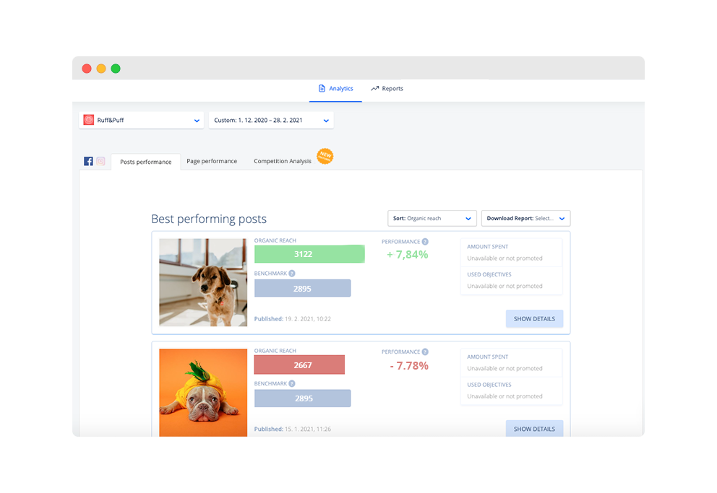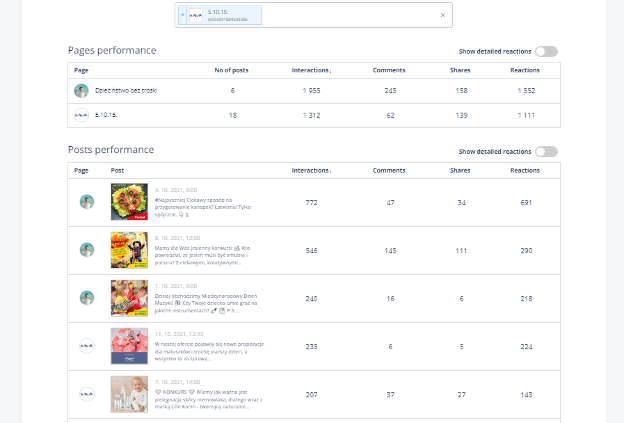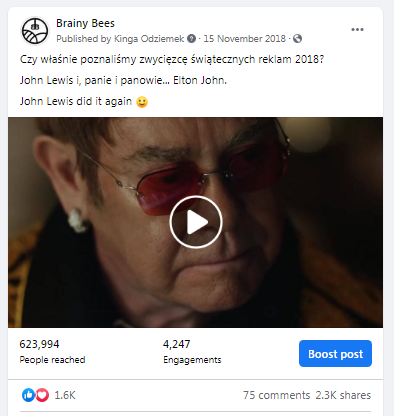12 LinkedIn Scheduling Tools for 2024
Tired of the LinkedIn posting hustle? You’re not the only one. Many social media managers struggle with consistent and regular LinkedIn communication. Since LinkedIn isn’t just about LinkedIn company pages,...

2021 is quickly coming to an end already. So when to summarize the year, if not now?
The end of the year is a time when marketers often have even more work than they usually do, so the term “social media audit” can send chills down their spines. However, the benefits of performing an audit make doing so a matter of when, not if.
You simply must evaluate your strategy from time to time if you want to keep up with not only social media trends, but also your direct competitors, industry, and… your audience.
This isn’t possible without a social media audit, which is what we’ll be discussing today. What’s more, we have prepared something that should make things easier for you, namely a social media audit template.
Long story short: a social media audit is an evaluation of your performance in the area of social media.
With a social media audit, you can:
Without a social media audit (and checking your results on a daily basis), trying to do any of the above would be nothing but guesswork.
An audit without research is like Starsky without Hutch – could exist, but what for?
You should prepare both your team and the necessary data to ensure that your social media audit will be completed in the most efficient way.
As a quick checklist, here are five elements of preparing for a social media audit:
Gathering all of these resources might take you some time, but compiling and organizing them into an audit doesn’t have to. Can you create a social media audit in 30 minutes? Now that we have your attention, let’s get started!
Okay, we now know that you actually want to get a social audit done. So what should your social media audit template consist of?

Start your social media audit by evaluating your brand’s performance on different social media platforms.
This will probably be the easiest aspect of the audit, as you could just list all the profiles you manage. However, that alone is not really enough. Your social media profiles should ideally go hand in hand with the KPIs and tactics you set for them.
You might not find enough time during the 30-minute social media audit to thoroughly examine each metric, though.
Such a quick social media audit provides a good chance to review:
A content review is an integral part of any social media audit.
In this part of your social media audit, you need to analyze almost every piece of published content one by one. Within 30 minutes, you should at least get a general sense of how your content is performing.
What should you check in this step?
*Beware: this can be a vanity metric if engagement is generated outside of your target audience.
There is no workaround – you simply NEED data in order to push things forward. If you haven’t already been gathering and verifying data frequently, then this task could be a daunting one.
It may be even worse if you take into consideration that some social media platforms only store statistics for a limited amount of time.
And you need to analyze your performance from back in 2019.
TGI Kontentino.
How Kontentino can help with a social media audit

In seconds, Kontentino lets you check social media statistics for any time period of your choice.
Each social media metric has a benchmark based on all of your posts published during the last 6 months to help you better understand your performance. You can check both Page and Posts performance for Facebook and Instagram (as of Oct 2021).
The purpose of this step is not only to find out how you are doing now, but also how you can improve your content. To make reviews easier and quicker in the future, you can label your posts in Kontentino.
Use social media content topic labels to identify types of communication lines quicker and find the right content balance. Labeling your social media pages according to topics, themes, or overall goals can help you filter and keep track of the types of content that you plan to post in the future.

Optimizing your performance on a regular basis with Kontentino, even without performing a dedicated social media audit, can save you huge amounts of time later on.
Let’s say that your brand has gained some new followers. Sounds great at first, right? However, are they just followers or are they actually part of your actual target audience?
Evaluating whether you reach the right target group is not always easy. You don’t have complete control over who actually follows your profile or interacts with your content – in an era of bots, anything can happen. You may discover this in your social media audit when you discover that the majority of your followers are not in your target audience.
Instead of giving up here, there are a few things you can do:
Your target group can only include everyone in the world if you sell air.
Your ideal target group should be more diversified, defined at the very beginning of your social media journey, and then adjusted retrospectively too.
Think you know everything that has ever been written about your brand online?
Well, you might be surprised, particularly if the term “social media monitoring” is unfamiliar to you.
Monitoring social media is a practice that was invented to help brands manage their reputations, and it can also help you with carrying out a quick social media audit.
A social media audit should include checking if your brand is being mentioned elsewhere on social media besides your own profiles. Additionally, you should indicate whether or not you have responded to all mentions on social media and what their sentiment was. Have you seen any negative comments about your brand recently? If so, why? Could you have changed anything or avoided such negativity escalating into a crisis if you had responded at all, or done so differently?
With so many tools available for social media monitoring, you have no excuse not to look at what, where, when, and why your brand is being mentioned online.
You can even use free Google Alerts to monitor any topics or keywords that are relevant to your business. Check not only mentions about your own brand but also mentions about your competitors at this stage. Which brings us to the next step.
Even if you only have 30 minutes to perform a social media audit, still spare a few of them to find out how your competitors are doing. You can get to know quite a few interesting facts about your competitors even without a thorough analysis.
Is it fair to say that you have performed well so far? Well done! However, it’s time to check if the same holds true for your competitors as well.
Here’s what you should (at least briefly!) analyze during this step:
Again, gathering all of that data yourself can be a pain in the neck if the only info you already have is the names of your competitors. Just having those names is enough for Kontentino, though. Comparing your performance with that of your competitors can LITERALLY be done in seconds using our competitive analysis feature.

No matter if you work with one, five, or fifty brands, you need to have a social media workflow figured out! Try answering the questions below:
Could you not find the answers to any of these questions? Then it appears that you have just spotted an area for improvement.
There is no unique approach to social media workflow. You should have some clear procedures in place for communicating with your clients and getting that desired “okay” for your content plans. Additionally, it is important to establish communication procedures within your team to ensure smooth communication.
Unless you have a workflow in place, you risk a lengthy approval process and missing the boat, especially when it comes to real-time marketing. With a social media audit done right, you can identify and fix gaps in your workflow. Even though it would be ideal to go through all of your social media procedures thoroughly, you might not have time for that at first. Even a quick analysis would be better than nothing in that case.
Kontentino won’t fix every problem in your workflow, but it can help with a number of them.

Kontentino can help you build your workflow with:
You won’t just fix what doesn’t work, you’ll also save precious time by automating mundane tasks and facilitating communication.
Social media audits sound daunting for a number of reasons, one of which is the assumption that they will show only negative information about your social media profiles. That doesn’t have to be the case!
Despite having a few things to improve upon, there’s always a possibility that you’ll find something that is positive and worth carrying on with (e.g. a particular type of content that performed extremely well).
You should be honest with yourself during each step of a social media audit, since hard data doesn’t lie. This one, though, is your evaluation point.
If you set the bar relatively high but achieved 80% of your goals then you can still be proud of yourself and strive for perfection in 2022.
If you missed your targets by a wide margin, identifying what went wrong is the first step. Even a quick 30 minute social media audit can show you A LOT.
Let’s face it: 30 minutes is not a whole lotta time.
Conducting a good social media audit so quickly is quite a challenge.
As we love helping you manage your social media, we decided to create a cheat sheet that should allow you to evaluate your social media performance in half an hour.
It’s highly likely that you’ll identify a few bottlenecks when performing a social media audit. Have you found yourself in trouble? No worries: let’s check what can be done to improve your performance in your next social audit.
If there were any “meh” results in your social media strategy execution, it’s important to identify and eliminate them for the coming year. Instead of telling you how important it is to sparkle on social media, let us show you a few actionable steps to take:
Even small changes can make a huge difference to your social media strategy.
You may find that there is nothing to evaluate, not because there are a lack of data but because there were no goals defined. That’s a mistake, but one which you can easily fix!
Ask yourself a question: why are you managing social media profiles at all? Is it to generate more sales, build a community around your brand, or bring more traffic to your website?
Well done. You’ve just found the basis of your KPI – your guidepost for more meaningful social media performance.
Why are reach and engagement not great KPIs per se?

In 2018, we published a video of John Lewis’ advert on our Facebook page. It generated more than 620k reach, 2.3k shares, and 1.6k reactions.
Sounds great, right?
Not when you take into consideration that we are a marketing agency and the majority of reactions and shares came from random people who don’t even know who we are.
PS. We’ve learned since then!
How can you be successful on social media if the group you reach is like our BB group mentioned above: not even slightly interested in what you’re REALLY doing?
A social media audit will show you who your audience is, but is it your target one? If not, is there any type of content that you published which resonated with those you want to reach? Try to follow less of your gut feelings and more of the good practices you identified during your social media audit.
Create a target persona and think about how you would speak to that person directly whenever you publish on social media from now on.
You need to be present where your audience is not just located, but more importantly where they are hyperactive. This is the only way to not only answer their needs, but to get feedback and interact with them properly too.
Conducting even a quick social media audit shows you which channels deliver the best results and which, frankly speaking, don’t work at all.
Instead of wasting energy on communication on ineffective profiles, focus on those that have potential, gather your target audience, and possibly even yield some results already. It might make very little sense for you to be on e.g. LinkedIn if you sell fashion accessories, whereas Facebook, Instagram, and Pinterest should be your three musketeers. If resources and time allow, add a fourth channel – TikTok.
You know a thing or two about social media and your team is well-experienced when it comes to running communication and content plans.
That’s great! But it doesn’t mean the collaboration is always rainbows and butterflies, right? Chances are you saw a glimpse of it during your social media audit.
What can you do here to score A+ on your next social media audit?
You don’t have to start with many rules at first, even two or three can be really beneficial for your workflow and thus your social media audit later too.
It is likely that many problems which occur while conducting your social media audit are due to a lack of time for work or reviewing results. This is completely normal, and many marketers can relate to it.
There are a few things you can do to free up a social media manager’s day and make the most of it, though.
One of them is to use smart social media tools and implement them into your workflow. We have listed the best ones in our recent article about best social media tools. How about picking one of them and finding out how much time you can save with it?
A social media audit can be your best friend – blunt at times, giving you helpful feedback, showing you where to improve, and praising you when you succeed.
You aren’t the only one – even the biggest fish in the marketing industry can always find ways to improve. Even if you operate social media profiles for just one brand, an audit of your social media accounts is not to be overlooked.
Since social media audits can be challenging to perform, we have created a social media audit template that you can use on your own profile.
Take your new friend, the social media audit, for a short 30 minute walk around your profiles today. Bring our template with you, and you may be amazed at what you discover in just half an hour!